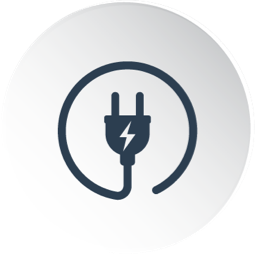
Denver Home Insulation
Insulation is an important contributing factor to the overall comfort of your home. In Colorado, we are lucky enough to be able to enjoy all four seasons to their fullest. In the winter, we experience snow and cold temperatures, and in the summer we experience days where temperatures can reach triple digits. With such wide variations in temperature throughout the year, it is imperative that the insulation in your home is up to par to ensure comfortable temperatures year round. Many people fail to realize that insulation installation companies are just as important in the summer as they are in the winter.
Questions?
"*" indicates required fields
What is Home Insulation?
Insulation is a term used to describe a wide range of products that reduce heat loss or heat gain by providing a barrier between areas that have a significant difference in temperature. An example of this could be a warm winter coat which insulates the human body from the cold temperature around it or blanket which someone can use to keep them warm on a cold winter night. Home insulation protects important areas of your home such as your hot water pipes and your HVAC system from freezing in the winter and traps precious conditioned air to keep your house cool in the summer.
Common Types of Home Insulation Installation
There are many types of insulation, and they all have the benefits and drawbacks. The types of insulation found in homes across Colorado include:
Fiberglass Insulation
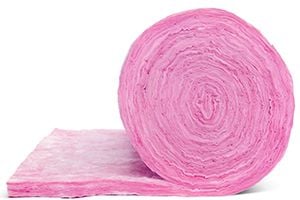
Fiberglass insulation happens to be the most common form of insulation used in homes. Fiberglass insulation minimizes heat transfer effectively because it is made with fine strands of glass that are woven into the insulation material. When installed properly and safely, fiberglass insulation can be very effective. It is non-flammable and has tremendous R-values. If you are seeking a relatively inexpensive form of insulation, fiberglass is the way to go. We encourage you to contact the home insulation experts at REenergizeCO so we can install your new insulation without a hitch.
Mineral Wool Insulation
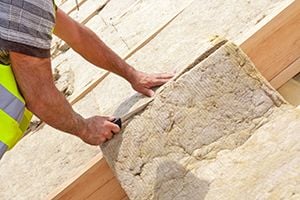
Mineral wool can be referred to as a number of different products such as:
- Glass wool made with recycled glass
- Rock wool made from basalt
- Slag wool made from slag from steel mills (the most common form of mineral wool)
Mineral wool comes in the form of batts and loose-fill material. Most mineral wool is not fire resistant which can make it vulnerable in situations where intense heat is present. It is often used to supplement other forms of insulation and can be very effective for insulating larger areas of a Colorado home.
Cellulose Insulation
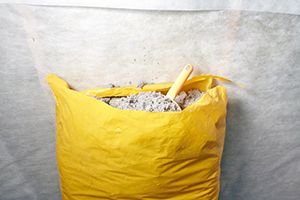
Cellulose insulation happens to be one of the most eco-friendly forms of insulation on the market today. It is made from mostly recycled materials and comes in a loose form. Recent studies on insulations have revealed that cellulose insulation may, in fact, be effective in minimizing fire damage. Because cellulose insulation is so compact, it contains little to no oxygen within it, which helps it contain fires. Cellulose insulation is great for retrofitting areas of your home and is an excellent supplementary insulation to fiberglass, spray foam, and mineral wool.
Polyurethane Foam Insulation (Spray Foam)
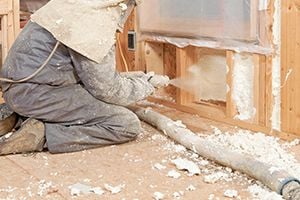
Polyurethane foam or spray foam insulation is a fantastic insulator with tremendous R-value. Acting as both an air barrier and moisture barrier, there is no better product on the market that will keep your home comfortable year round. It is created on site and sprayed onto the desired area. From there, it expands to fill any crack and crevice it encounters. Spray foam in impermeable to water as well, making it odorless and mold resistant if ever encountered by excess water.
Client Reviews & Testimonials
How Much Does Home Insulation Installation Cost?
The cost of installing insulation varies widely and depends largely on the type of insulation that you choose. Whether you choose spray foam insulation, blown-in insulation, or batts, the cost of your project will vary. The location in which you choose to insulate will also affect the price of your project. Insulation is most commonly installed or retrofitted in attics, garages, walls, crawlspaces, and basements. For more information on insulation pricing, click here.
Does My Colorado Home Need Insulation?
The amount of insulation needed is determined by the type of R-value insulation you use. For loose fiber insulation such as cellulose, multiply the R-value of your insulation by 3.7 to get the depth in inches needed. For fiberglass insulation multiply the R-value of your insulation by 3.2 to get the depth needed.
In the video below, Casey measures the insulation of a Denver attic. He tells us how REenergizeCO will increase the level of insulation in the attic to qualify for the Denver Energy Challenge.
The climate in Denver varies drastically! One day it could be 70 and sunny and the next day 20 degrees. The US Department of Energy has set a recommended R-value for different climates and heat source. Denver requires a higher R-value than an area that does not share our cold weather such as Phoenix or San Diego.
If you live in Colorado and you use electric heat, it is recommended you use R-49 in your attic, R-22 in your walls, R-19 in your basement and R-25 in your floors.
If you use natural gas to heat your home, it is recommended you use R-49 in your attic, R-18 in your walls, R-11 in your basement and R-25 in your floors.
Our Colorado home insulation company, REenergizeCO installs both Cellulose and Fiberglass insulation for attics, walls, and floors of homes and small businesses along the Front Range and Mountain towns. The leading cause of energy loss in a home is inadequate insulation. Adding insulation to your attic or walls will help keep your home cool in the summer and warm in the winter. You will save money on your utilities, and your home will be more comfortable with an even temperature throughout the house.
We offer comprehensive home energy audits that will test your home’s energy efficiency. We can identify the strengths and weaknesses and advise you in what areas to invest in your home.
Where Should I Insulate My Home?
There are many areas in your home in which REenergizeCO can retrofit or install new insulation. It is important to bear in mind that no two dwellings are exactly the same. Our technicians will thoroughly examine your home for areas where you are losing energy, then make recommendations for new insulation based on the areas that need attention.
Commonly we install insulation in the following areas in homes across Colorado:
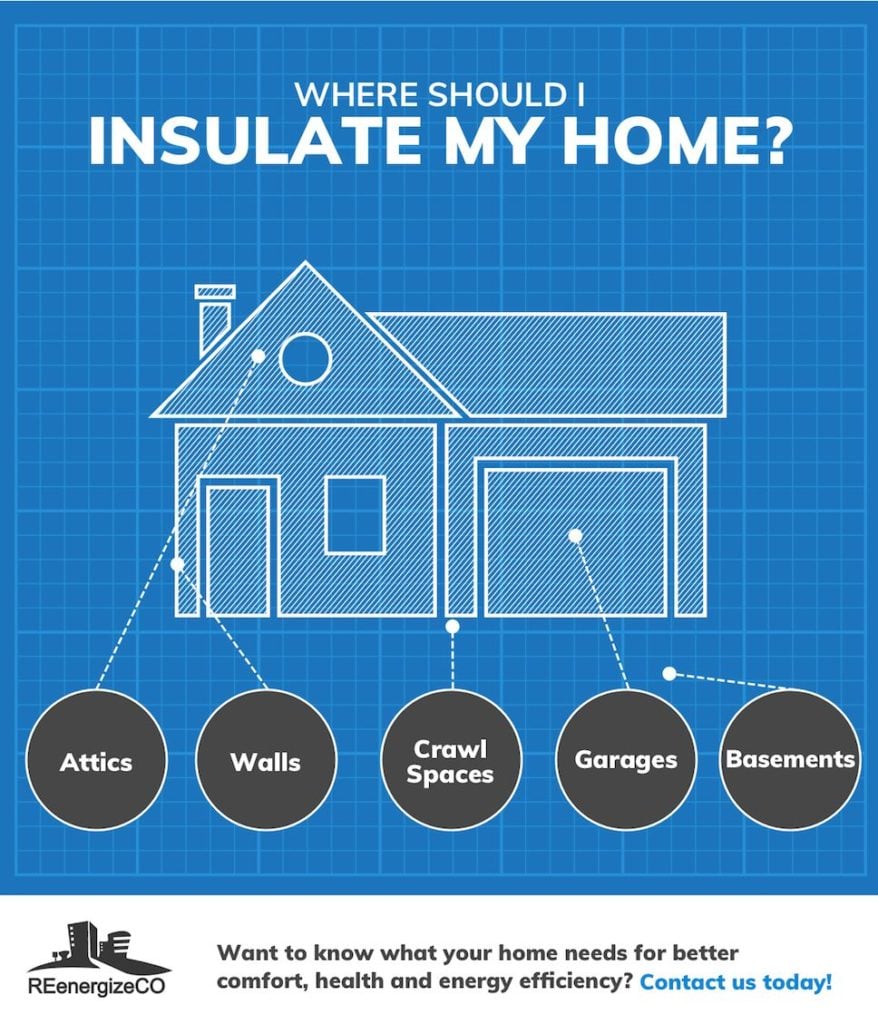
Attics
Your attic space is the area above the ceiling and under the roof. It is typically dark, dirty and unless your house was built in the 2000’s or later, it is under-insulated. There are many types of insulation for attic spaces, but the two we work with most are cellulose and fiberglass, both of which are “blown in.” We use machines that are on trailers that grind up the insulation into loose-fill, and we power it through a hose into the attic. We then evenly distribute it over the area to a pre-determined R-value.
The definition of R-value (resistance value of the insulation) refers to how much heat can move through it. The greater the R-value, the more heat you can keep in your home during the winter, and how much heat you can keep out in the summer. Attic R-values are measured by the inch. 1″ of fiberglass has an R-value of 2.7 while 1″ of cellulose has an R-value of 2.9. Current R-value codes range from R38 to R60 in most attic spaces.
Walls
Exterior walls are insulated; interior walls are not. When exterior walls are built without insulation or are under-insulated, that needs to be fixed. There are various methods to insulate an already built wall, but we only endorse one.
We use a 4″ hole saw, and we cut into each vertical wall bay (from the inside) every 16″ in the middle of an 8″ wall, and in the middle of the 16″ cavity. This allows us to use a trailer mounted machine with PSI air pressure and a 2″ fill hose in the 2×4 or 2×6 wall cavity to DENSE PACK the space with fiberglass for two reasons. We want no air movement in the wall, so the insulation is packed tight inside the wall cavity. Current code for above grade 2×4 walls is R13, and 2×6 walls are R19.
Crawl Spaces
Every home needs crawl space insulation. Crawl space insulation is often installed by fitting the rim joists of the crawlspace and walls with a thermal barrier. Insulating crawl spaces can be counterintuitive. Conventional wisdom would tell you that the roof of your crawl space should be the area you insulate, but in reality, it is the last place you want to put insulation. Installing insulation around the concrete exterior walls and rim joists will allow warm air to flow freely through the floor above and trap it within the crawlspace. If conditioned air is escaping through areas of your crawl space, you will lose energy as well as comfortability in the room above.
Garages
Whether or not you insulate your garage depends on what you use it for. If your garage is attached to your home, under a finished room, or if you use it for work, you may want to consider insulating it. Insulting the exterior walls of your garage can benefit the temperature within the garage itself and the rooms that are attached to it. Because many garages are not insulated, many of the rooms that are attached to them, lose precious conditioned air throughout the year.
Basements
Basements are often dark and damp compared to the rest of your home. Nowadays, many people across Colorado are converting their basements into home entertainment centers and livable spaces. People want a comfortable, warm space when they’re watching the big game or hosting a group. Upgrading or adding insulation to your basement walls can help with that. Your basement is often a major source of your home’s energy loss. Fix this issue, and contact REenergizeCO today to ask about our basement insulation services.
What is Insulation R-Value?
The definition of R-value is resistance value of the insulation in regards to how much heat can move through it. The greater the R-value, the more heat you can keep in your home during the winter. Or how much heat you can keep out in the summer. Attic R-values are measured by the inch. 1″ of fiberglass has an R-value of 2.7 while 1″ of cellulose has an R-value of 2.8. Current R-value codes range from R38 to R60 in most attic spaces. Current code for above grade 2×4 walls is R13, and 2×6 walls are R19. In layman’s terms, the higher R-value insulation has, the greater effect it will have against heat transfer.
For loose fiber insulation such as cellulose, multiply the R-value of your insulation by 3.7 to get the depth in inches needed. For fiberglass insulation multiply the R-value of your insulation by 3.2 to get the depth needed.
The climate in Denver varies drastically! One day it could be 70 and sunny and the next day 20 degrees. The US Department of Energy has set a recommended R-value for different climates and heat source. Denver requires a higher R-value than other warmer cities across the nation.
REenergizeCO: Colorado Home Insulation Contractors
At REenergizeCO, we have been named a “Top Gun Rebate Producer” by Xcel Energy for the past four years for our commitment to insulation services in Colorado. We are a Colorado-born company, and provide insulation services across the entire state. Unlike other home insulation companies in Colorado, we do not hire 3rd party insulation contractors.
We are a BPI and LEED Certified energy company. At REenergizeCO, we hold ourselves to the highest standard when it comes to serving homeowners across the state of Colorado. Trust that we will carry these standards into serving you and your home insulation needs. Contact us now.
Commonly Asked Questions About Home Insulation
What is the best type of insulation?
Every type of insulation (foam, cellulose, and fiberglass) has their inherent benefits and drawbacks, and each performs differently depending on the application. At REenergizeCO, we don’t specialize in one insulation. We are an experienced Denver contractor. We offer our customers options and take the time to explain all of the benefits and limitations each type of insulation has. At the end of the day, we want you to be comfortable in your home, and we’ll do our best to supply you with insulation that will allow you to do so.
What does retrofit mean?
Retrofitting a home’s insulation simply means upgrading a home’s insulation by adding, replacing, or removing insulation. During a retrofit, we will remove small sections of siding and drill small holes into the walls. Next, we insert a small hose into the hole and fill the space. This will result in a nice insulated wall cavity.
What insulation is eco-friendly?
There are certain types of insulation that are more eco-friendly than others. For example, our cellulose insulation that we use in homes all over Colorado is made up mostly of recycled materials.
How can I know what the R-value of my insulation is?
The R-value of your insulation will be determined by what type of insulation you are using. Insulations come with a predetermined R-value, so be sure to ask the experts at REenergizeCO what the recommended R-values are for your project. It shouldn’t be overlooked that insulation will decrease in R-value over time as the product grows older and settles within its space.
Will insulating certain areas of my home result in energy savings?
Insulating certain areas of your home may lead to some energy savings, but to get the most out your insulation, you should insulate your entire home. Visit our pricing page to learn more.
Can insulation reduce sound?
In fact, insulation can reduce unwanted sound and can provide a more quiet and comfortable environment within your home. Insulation can effectively reduce noise that flows through the interior and exterior walls, as well as through the floors.

